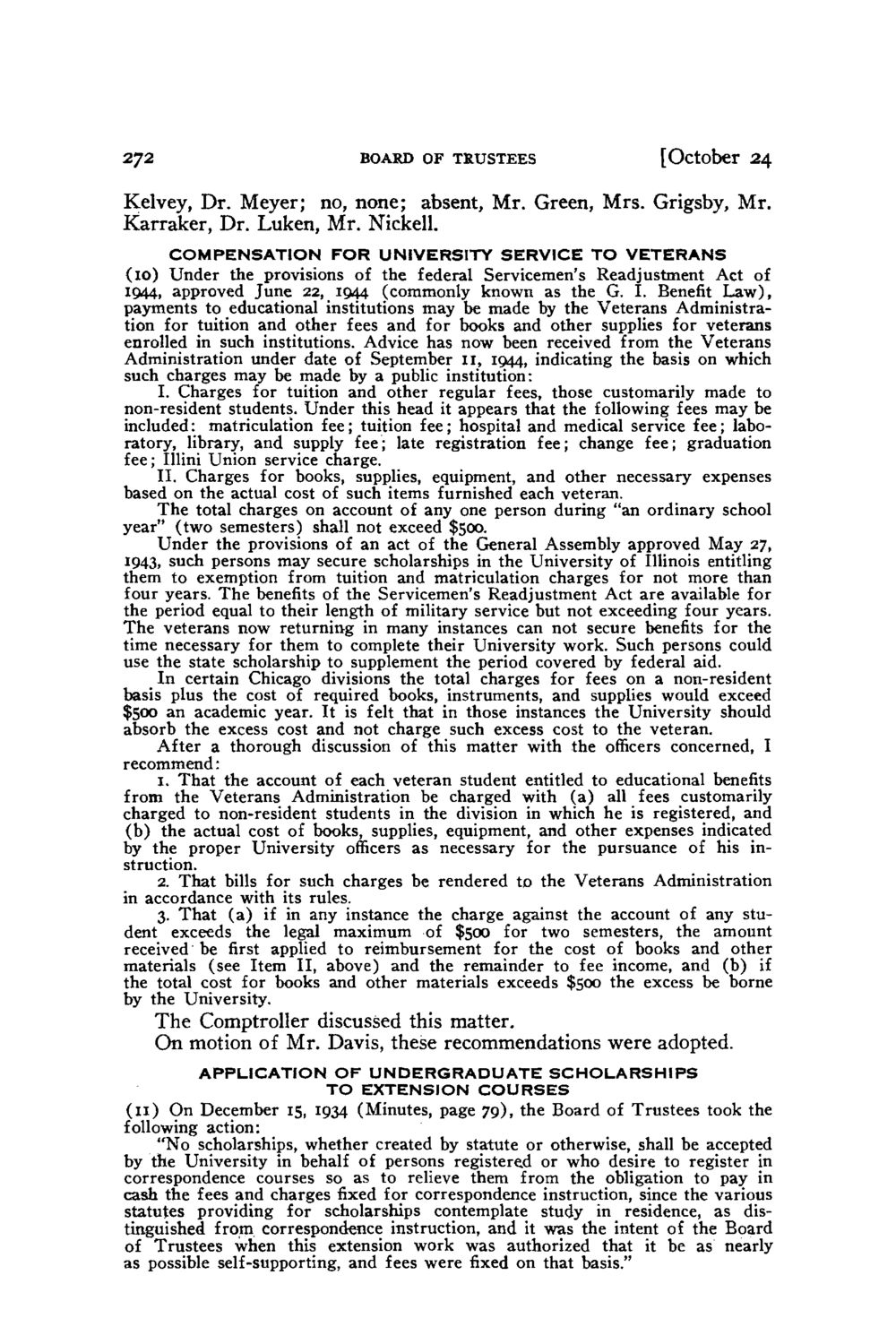| |
| |
Caption: Board of Trustees Minutes - 1946
This is a reduced-resolution page image for fast online browsing.

EXTRACTED TEXT FROM PAGE:
272 BOARD OF TRUSTEES [October 24 Kelvey, Dr. Meyer; no, none; absent, Mr. Green, Mrs. Grigsby, Mr. Karraker, Dr. Luken, Mr. Nickell. COMPENSATION FOR UNIVERSITY SERVICE TO VETERANS (10) Under the provisions of the federal Servicemen's Readjustment Act of 1044, approved J u n e 22, 1044 (commonly known as the G. I. Benefit L a w ) , payments to educational institutions may be made by the Veterans Administration for tuition and other fees and for books and other supplies for veterans enrolled in such institutions. Advice has now been received from the Veterans Administration under date of September 11, 1044, indicating the basis on which such charges may be made by a public institution: I. Charges for tuition and other regular fees, those customarily made to non-resident students. Under this head it appears that the following fees may be included: matriculation fee; tuition fee; hospital and medical service f e e ; laboratory, library, and supply fee; late registration fee; change fee; graduation fee; Illini Union service charge. II. Charges for books, supplies, equipment, and other necessary expenses based on the actual cost of such items furnished each veteran. T h e total charges on account of any one person during "an ordinary school year" (two semesters) shall not exceed $500. U n d e r the provisions of an act of the General Assembly approved May 27, 1943, such persons may secure scholarships in the University of Illinois entitling them to exemption from tuition and matriculation charges for not more than four years. T h e benefits of the Servicemen's Readjustment Act are available for the period equal to their length of military service but not exceeding four years. T h e veterans now returning in many instances can not secure benefits for the time necessary for them to complete their University work. Such persons could use the state scholarship to supplement the period covered by federal aid. I n certain Chicago divisions the total charges for fees on a non-resident basis plus the cost of required books, instruments, and supplies would exceed $500 an academic year. It is felt that in those instances the University should absorb the excess cost and not charge such excess cost to the veteran. After a thorough discussion of this matter with the officers concerned, I recommend: 1. T h a t the account of each veteran student entitled to educational benefits from the Veterans Administration be charged with (a) all fees customarily charged to non-resident students in the division in which he is registered, and ( b ) the actual cost of books, supplies, equipment, and other expenses indicated by the proper University officers as necessary for the pursuance of his instruction. 2. T h a t bills for such charges be rendered to the Veterans Administration in accordance with its rules. 3. T h a t ( a ) if in any instance the charge against the account of any student exceeds the legal maximum of $500 for two semesters, the amount received be first applied to reimbursement for the cost of books and other materials (see Item I I , above) and the remainder to fee income, and (b) if the total cost for books and other materials exceeds $500 the excess be borne by the University. The Comptroller discussed this matter. On motion of Mr. Davis, these recommendations were adopted. APPLICATION O F UNDERGRADUATE SCHOLARSHIPS T O EXTENSION COURSES (11) On December 15, 1934 (Minutes, page 79), the Board of Trustees took the following action: " N o scholarships, whether created by statute or otherwise, shall be accepted by the University in behalf of persons registered or who desire to register in correspondence courses so as to relieve them from the obligation to pay in cash the fees and charges fixed for correspondence instruction, since the various statutes providing for scholarships contemplate study in residence, as distinguished from correspondence instruction, and it was the intent of the Board of Trustees when this extension work was authorized that it be as nearly as possible self-supporting, and fees were fixed on that basis."
| |